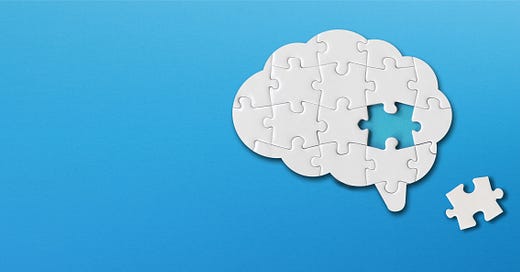Weekly Roundup: How and Why the Mind Blanks, Adaptable Learning is Most Effective, How Memories Can Change Metabolism (and Burn Fat).
This week it’s a few key reviews: how and why the mind blanks, the key question of individual and social learning, and how to up-regulate your metabolism with memories!
Mind Blanking
Our brains generally operate by producing a constant stream of consciousness. As we sit quietly our brains are generally active and we experience low-level stream of thoughts. We may even experience this when we are meant to be focusing on tasks. I personally am a master of this mind-wandering, often drifting off onto tangental thoughts.
This mind-wandering has been pretty well-researched and is associated with what we call the default mode network which is how the brain hums along when no focused tasks are at hand. But there is another phenomena that you will have experienced that is under researched - this is mind blanking.
Mind blanking is when our brain seems to go empty for a few moments, this may include those moments when we blank, sometimes mid sentence, but also at other times when our brain really does seem to shut down and our stream of thoughts stops.
I was intrigued to read this review of the topic just published. In this Andrillon et al. review over 8o studies.
What did they find?
A lot:
When does it happen?
Mind blanking varies greatly between people, but a person experiences the phenomenon about 5%-20% of the time on average. That’s quite a lot actually!
Common experiences defined as "mind blanking" include lapses of attention, memory issues, and a stopping of inner speech, amongst others.
Mind blanks tend to happen toward the end of long, sustained attention tasks such as focused work or exams, after sleep deprivation, and after intense physical exercise, which may be unsurprising.
Mind blanks also appear to be a common waking state.
Children with attention deficit hyperactivity disorder (ADHD) report mind blanking more frequently than neurotypical people.
Classification
Mind blanking is part of the clinical description of generalised anxiety disorder in the Diagnostic and Statistical Manual of Mental Disorders (DSM-5). It is also relevant to several other clinical conditions including strokes, seizures, traumatic brain injuries, and the lesser-known Kleine-Levin syndrome (which causes people to sleep up to 20 hours per day).
What’s happening in the brain?
fMRI and electroencephalography experiments show that there are specific brain signatures in the frontal, temporal, and visual networks of the brain before a mind blank.
During mind blanks after sustained attention tasks, people's heart rates and pupil sizes decreased and their brains showed lower signal complexity - a state that is actually typically observed in unconscious people. During the blank, we can see disruptions in sensory processing and slow, sleep-like EEG waves. The authors describe these states in which parts of a person's brain appear asleep as "local sleep episodes."
An increase in neural activity in posterior (rear) cortical brain regions can also lead to mind blanking, as is the case when high-speed thinking leads to slower cognitive function.
When people were prompted to actively "empty their minds," researchers observed deactivations in the inferior frontal gyrus, Broca's area (a linguistic area), supplementary motor cortex, and hippocampus.
That’s a bunch of information but what I found surprising is the frequency with which this occurs and that mind blanking seems to be preceded by a clear neural signature.
Mind blanking appears to be a unique state and very different to the default mode network and represents more of a localised sleep - indeed a blank out. This seems to by partly modulated by fatigue.
So if your mind blanks, first don’t worry, this is normal for all of us. But it may also be a sign that it’s time for a rest. As we know, taking regular rests is good - and entering default mode network (not mind blanking) state aka mind-wandering may also be beneficial in other ways such as with increased creativity and help in problem solving.
Speaking of solving problems, another study, hot off the presses, has looked at how individual strategies combine with social learning for more success….using the game Minecraft.
Adaptable Learning Drives Success
Society is complex and some of us and political parties may develop different mantras of what drives success. Some for example promote individualisation and individual responsibility and other collective processes and responsibility. It may seem obvious, in my mind, that both operate together. But how and to what degree? Considering that selfish individuals can sometimes appear to be successful is collaboration and collaborative learning really the best thing.
Indeed research into human beings compared to other animals seem to show that we fall on the side of exploitative rather than explorative. That means that when we find a strategy that works and gives us a benefit, such as in many businesses we tend to stick with the strategy and exploit or extract, until it really doesn’t work.
This topic is interesting but I also found this research fascinating in no short measure because of the methodology: using the video game Minecraft!
Keep reading with a 7-day free trial
Subscribe to leading brains Review to keep reading this post and get 7 days of free access to the full post archives.





